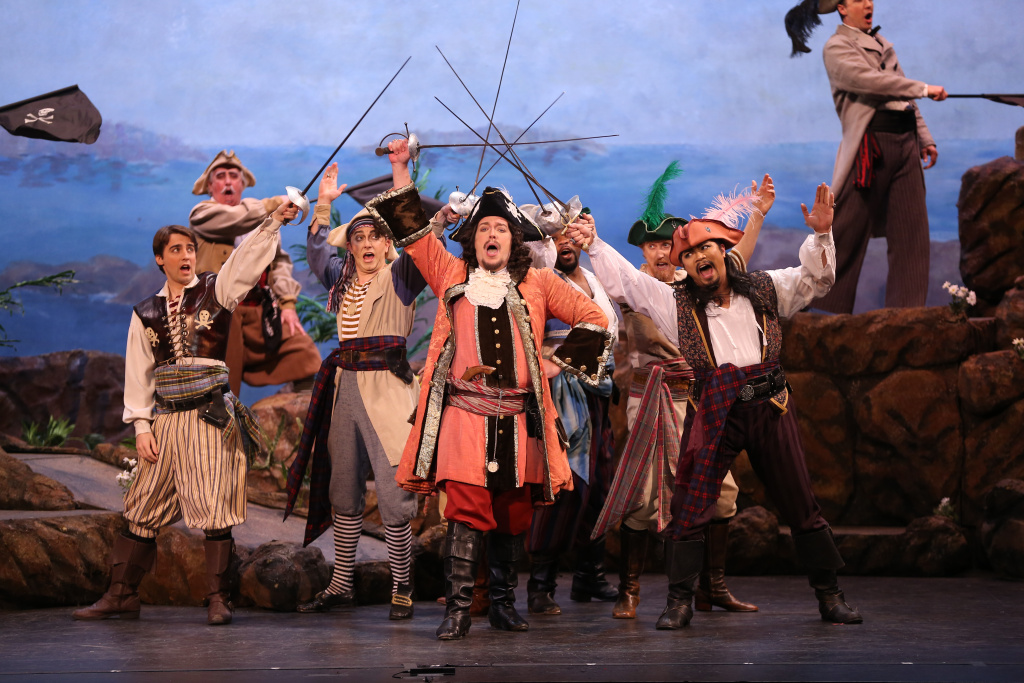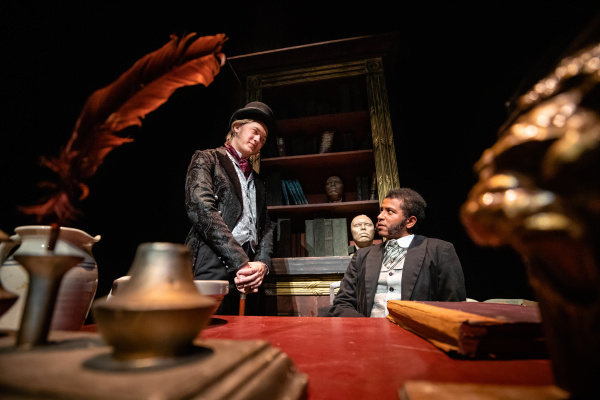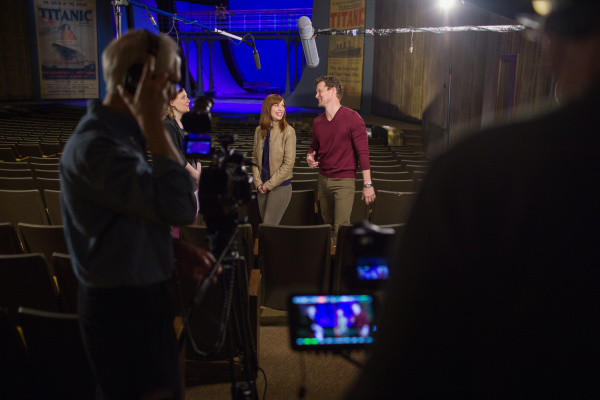Unlike what many think when they hear the word “opera,” Gilbert and Sullivan’s The Pirates of Penzance is a comical operetta written in English. Performed in English. In under two hours. It tells the tale of Frederic, who—thanks to his nurse’s mistake—was apprenticed as a pirate rather than a pilot. At the end of his contract, he is reminded that he was apprenticed until his twenty-first birthday—a slight problem considering he was born on February 29. A man of duty, he decides to honor his contract which technically ends when he is 63.
History of The Pirates of Penzance
During the time The Pirates of Penzance was written, international copyright laws did not exist. Englishmen Gilbert and Sullivan’s previous work—the operetta H.M.S. Pinafore—had suffered many unauthorized performances in America. To ensure that The Pirates of Penzance would not be pirated the same way, the operetta had three “first” performances to establish copyright on both sides of the Atlantic.
The first performance was on Dec. 30, 1879, at the Royal Bijou Theatre in Paignton, England. Solely intended to secure English copyright, the cast even used scripts during the scaled-down performance. The next day, the show opened at the Fifth Avenue Theatre in New York City with Sullivan himself conducting. Allison Horsley—former professor at the University of Denver—said, “Legend has it that Sullivan left the completed score in London before his and Gilbert’s departure to America for the premiere, and (rewrote) it on the high seas.” The final opening performance was on April 3, 1880, at the Opera Comique in London, after which the operetta remained in theaters for a year.
Parody of the Production
The Pirates of Penzance is a production that pokes. Throughout the work, Gilbert and Sullivan poke at the society of their day. The Huntington Theatre Company’s guide to the operetta reads, “To Victorians, Frederic’s view of duty was a parody of their own moral code, which emphasized constant and vigilant self-discipline. … (They) believed that their reward for upholding the virtue of duty was not only a place in heaven but also middle-class respectability.”
The operetta also undermines the nobility. Horsley wrote, “The eponymous pirates … are outcast or disenfranchised nobility living in the time of Queen Victoria. Gilbert and Sullivan used anachronism in this case to make a satirical point about the superficial and seemingly arbitrary nature of the aristocracy in Victorian England.”
The irony of the setting supports the parody. Horsley explained, “Located in Cornwall (southwest England), Penzance is a picturesque coastal town that, historically, was subjected to foreign raids as a result of its location. By 1879, when Gilbert and Sullivan penned The Pirates of Penzance, the town had a reputation for being a serene place to live and visit, and a center of commerce for the region. In naming their musical The Pirates of Penzance, Gilbert and Sullivan infuse the story with irony through its unexpected title.”
In addition to poking at society, the work is a parody of traditional operas. Betsy Schwarm—former music faculty of Metropolitan State University of Denver—wrote, “Many serious operas of the time … called for characters to sing onstage at the same time yet remain oblivious to each other’s presence … In Act II, … the pirate-hunting policemen fail to notice those pirates who have just stalked onstage singing ‘With Cat-Like Tread,’ for which Sullivan specified a fortissimo dynamic.” She also added that one scene mimics the soprano and flute’s duet in Donizetti’s Lucia di Lammermoor.
Gilbert and Sullivan: The Dynamic Duo
Sir William Schwenck Gilbert (1836–1911) was the librettist of the duo’s famous works. However, he originally pursued law. On the side, he exercised his talent of writing comic verse, which he had published in a magazine. In the 1860s, he began writing dramatic works for performance.
Meanwhile, Sir Arthur Seymour Sullivan (1842–1900) was becoming an accomplished musician. Since his father was an Irish military musician, he had an early introduction to music and learned to play multiple instruments at a young age. He gained musical experience by joining the Chapel Royal choir, studying at the Royal Academy of Music and the Leipzig Conservatory, and being a church organist in London. Soon he was composing orchestral works, choral works, incidental music to plays and even ballets.
These two men, although individually successful, achieved their greatest fame when Gilbert’s wit met Sullivan’s melodies and musical parodies. In 1871, John Hollingshead—manager of the Gaiety Theatre—commissioned the two to write their first comic opera Thespis. A few years later, Richard D’Oyly Carte commissioned another work which they titled Trial by Jury.
Gilbert and Sullivan went on to write 12 more comic operettas. Horsley wrote, “As Gilbert and Sullivan’s twenty-five-year partnership grew and evolved, so did their style of writing—from satirical operetta to something more akin to the modern musical.” Like The Pirates of Penzance, their operettas are memorable for upbraiding society. “Using the deadpan to communicate the outrageous,” Horsley wrote, “(they) got away with brazen social commentary in the form of upbeat musical comedy.”
Performance at BJU
Next in BJU’s Concert, Opera & Drama Series, the New York Gilbert & Sullivan Players, directed by Albert Bergeret, will present The Pirates of Penzance. Founded in 1974, the company performs 12 other complete Gilbert and Sullivan operettas along with other performances based on the duo’s works. The operetta will be presented in its original format at 7:30 p.m. on Feb. 4 and 6 in Rodeheaver Auditorium.








